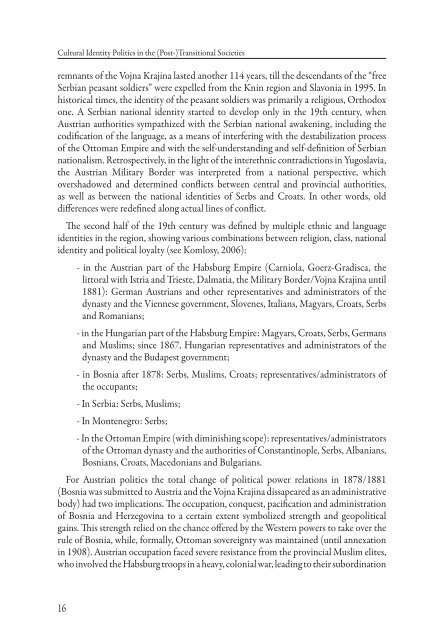free download in pdf format - Culturelink Network
free download in pdf format - Culturelink Network
free download in pdf format - Culturelink Network
You also want an ePaper? Increase the reach of your titles
YUMPU automatically turns print PDFs into web optimized ePapers that Google loves.
Cultural Identity Politics <strong>in</strong> the (Post-)Transitional Societies<br />
remnants of the Vojna Kraj<strong>in</strong>a lasted another 114 years, till the descendants of the “<strong>free</strong><br />
Serbian peasant soldiers” were expelled from the Kn<strong>in</strong> region and Slavonia <strong>in</strong> 1995. In<br />
historical times, the identity of the peasant soldiers was primarily a religious, Orthodox<br />
one. A Serbian national identity started to develop only <strong>in</strong> the 19th century, when<br />
Austrian authorities sympathized with the Serbian national awaken<strong>in</strong>g, <strong>in</strong>clud<strong>in</strong>g the<br />
codifi cation of the language, as a means of <strong>in</strong>terfer<strong>in</strong>g with the destabilization process<br />
of the Ottoman Empire and with the self-understand<strong>in</strong>g and self-defi nition of Serbian<br />
nationalism. Retrospectively, <strong>in</strong> the light of the <strong>in</strong>terethnic contradictions <strong>in</strong> Yugoslavia,<br />
the Austrian Military Border was <strong>in</strong>terpreted from a national perspective, which<br />
overshadowed and determ<strong>in</strong>ed confl icts between central and prov<strong>in</strong>cial authorities,<br />
as well as between the national identities of Serbs and Croats. In other words, old<br />
diff erences were redefi ned along actual l<strong>in</strong>es of confl ict.<br />
Th e second half of the 19th century was defi ned by multiple ethnic and language<br />
identities <strong>in</strong> the region, show<strong>in</strong>g various comb<strong>in</strong>ations between religion, class, national<br />
identity and political loyalty (see Komlosy, 2006):<br />
- <strong>in</strong> the Austrian part of the Habsburg Empire (Carniola, Goerz-Gradisca, the<br />
littoral with Istria and Trieste, Dalmatia, the Military Border/Vojna Kraj<strong>in</strong>a until<br />
1881): German Austrians and other representatives and adm<strong>in</strong>istrators of the<br />
dynasty and the Viennese government, Slovenes, Italians, Magyars, Croats, Serbs<br />
and Romanians;<br />
- <strong>in</strong> the Hungarian part of the Habsburg Empire: Magyars, Croats, Serbs, Germans<br />
and Muslims; s<strong>in</strong>ce 1867, Hungarian representatives and adm<strong>in</strong>istrators of the<br />
dynasty and the Budapest government;<br />
- <strong>in</strong> Bosnia aft er 1878: Serbs, Muslims, Croats; representatives/adm<strong>in</strong>istrators of<br />
the occupants;<br />
- In Serbia: Serbs, Muslims;<br />
- In Montenegro: Serbs;<br />
- In the Ottoman Empire (with dim<strong>in</strong>ish<strong>in</strong>g scope): representatives/adm<strong>in</strong>istrators<br />
of the Ottoman dynasty and the authorities of Constant<strong>in</strong>ople, Serbs, Albanians,<br />
Bosnians, Croats, Macedonians and Bulgarians.<br />
For Austrian politics the total change of political power relations <strong>in</strong> 1878/1881<br />
(Bosnia was submitted to Austria and the Vojna Kraj<strong>in</strong>a dissapeared as an adm<strong>in</strong>istrative<br />
body) had two implications. Th e occupation, conquest, pacifi cation and adm<strong>in</strong>istration<br />
of Bosnia and Herzegov<strong>in</strong>a to a certa<strong>in</strong> extent symbolized strength and geopolitical<br />
ga<strong>in</strong>s. Th is strength relied on the chance off ered by the Western powers to take over the<br />
rule of Bosnia, while, formally, Ottoman sovereignty was ma<strong>in</strong>ta<strong>in</strong>ed (until annexation<br />
<strong>in</strong> 1908). Austrian occupation faced severe resistance from the prov<strong>in</strong>cial Muslim elites,<br />
who <strong>in</strong>volved the Habsburg troops <strong>in</strong> a heavy, colonial war, lead<strong>in</strong>g to their subord<strong>in</strong>ation<br />
16



